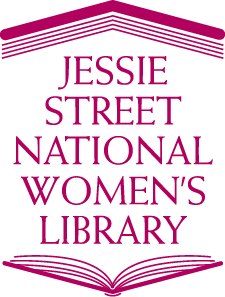Who was Jessie Street?
Jessie Street (1889-1970) was an activist, a feminist and a lifelong campaigner for women’s rights, the peace movement and the elimination of discrimination against Aboriginal people. She worked throughout her life to improve the status of women, both in Australia and overseas. Established in 1989, the centenary of Jessie’s birth, the Library was named in her honour.
“She rang me up late one night in 1956 (she always rang very late or very early) and said in her lovely, cultivated voice: ‘You can’t get anywhere without a change in the Constitution and you can’t get that without a referendum. You’ll need a petition with 100,000 signatures. We’d better start on it at once.’ And we did. Jessie’s role in our movement was absolutely vital. And she never wanted honour and glory. She’d give ideas away and the credit along with them.”

A quote from Faith Bandler (1918-2015) feminist, activist, author who campaigned for the rights of Aboriginal, Torres Strait Islander and South Pacific Islander peoples, talking about the pivotal role played by Jessie Street in the campaign for the 1967 referendum which amended the Australian constitution to enable Aborigines to be counted in the census. (Jessie Street, A Revised Autobiography, 2004)
Jessie fought for equality of status for women, equal pay, the rights of women to retain their jobs after marriage, appointment of women to public office and their election to Parliament. She stood for Federal Parliament twice and was only narrowly defeated each time. She founded the United Associations of Women in Australia in 1929, one of the most politically forceful women’s organisations in the country.
 Jessie was well known internationally, attending women’s conferences all over the world and working with women’s groups in different countries. She was the sole woman on the Australian delegation to the founding conference of the United Nations in San Francisco in 1945. With other women, she was instrumental in having a permanent Commission on the Status of Women established within the United Nations, separate from the Human Rights Commission. She was its first Vice President. Jessie also played a pivotal role in the campaign for the 1967 referendum which amended the Australian constitution to enable Aborigines to be counted in the census.
Jessie was well known internationally, attending women’s conferences all over the world and working with women’s groups in different countries. She was the sole woman on the Australian delegation to the founding conference of the United Nations in San Francisco in 1945. With other women, she was instrumental in having a permanent Commission on the Status of Women established within the United Nations, separate from the Human Rights Commission. She was its first Vice President. Jessie also played a pivotal role in the campaign for the 1967 referendum which amended the Australian constitution to enable Aborigines to be counted in the census.
Books about Jessie Street
The following books on Jessie Street can be bought from the Library:
- Jessie Street: A Revised Autobiography, edited by Lenore Coltheart (The Federation Press, Sydney, 2004)
- Jessie Street: Documents and Essays, edited by Heather Radi (Women’s Redress Press, Sydney, 1990) (the Library holds the only copies of these available.)
- Jessie Street: A Short Biography, by Heather Radi (produced by Jessie Street National Women’s Library, 2002 and republished 2013)

